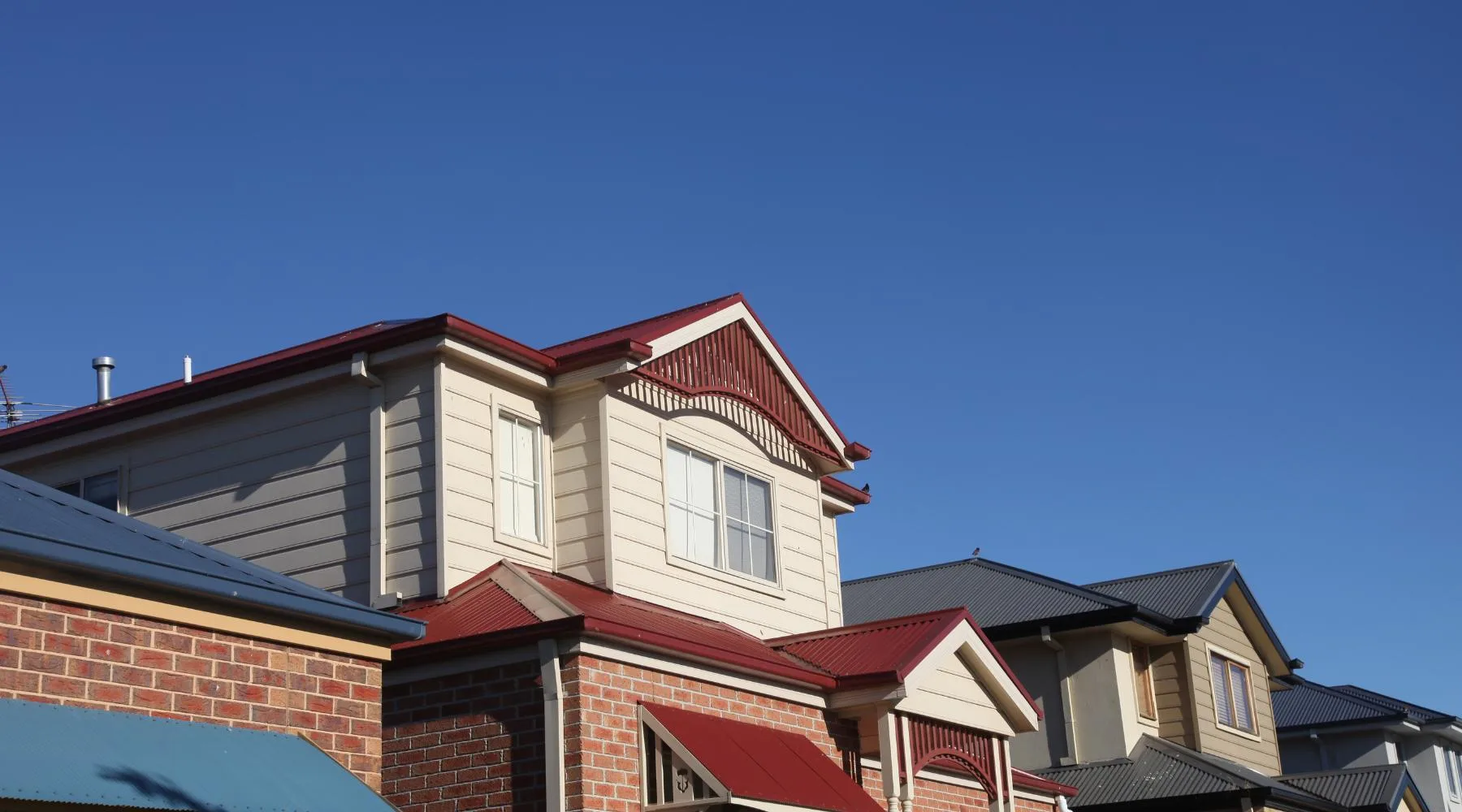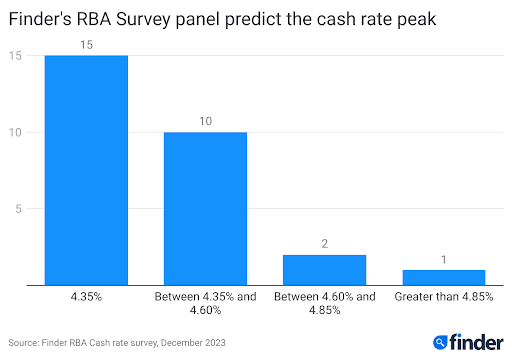Finder’s RBA survey: 82% of experts confident the cash rate will hold

Aussie homeowners won't be getting coal in their economic stockings this December, following lower-than-expected inflation figures.
In this month's Finder RBA Cash Rate Survey™, 38 experts and economists weighed in on future cash rate moves and other issues relating to the state of the economy.
More than 4 in 5 experts (82%, 31/38) believe the RBA will hold the cash rate at 4.35% in December, leaving 18% (7/38) predicting an increase.
Graham Cooke, head of consumer research at Finder, said a cash rate hold will be welcome news to cash-strapped mortgage holders.
"The RBA was threatening to pull the presents from under the Christmas tree for many homeowners, but falling inflation means they can breathe a quiet sigh of relief.
"Inflation is the one number the RBA is most heavily influenced by, so this downward trend is great to see.
"Aussies with a home loan can now look forward to 2 months of certainty, as the RBA does not make a decision in January – and can only make 8 cash rate changes next year," Cooke said.
From 2024, the RBA will meet 8 times a year, rather than 11 times as is currently the case.
Evgenia Dechter from UNSW said declining inflation pointed to a hold this month.
"Other domestic and global indicators also project a slowdown in the Australian economy. However, immigration inflow remains high, creating an upward pressure on prices in the short run," Dechter said.
More than 1 in 3 (37%) Australian homeowners said they struggled to pay their mortgage in November, according to Finder's Consumer Sentiment Tracker.
Most experts now predict that the cash rate has peaked
The majority of panellists (54%, 15/28) now say the cash rate has peaked at 4.35%.
However, nearly half (46%, 13/28) say another rate rise is yet to come.
Cooke said despite an expected rate hold in December, homeowners aren't out of the woods.
"If inflation doesn't continue to ease, we are looking at another rate rise early next year," Cooke said.

2024 to see fewer first home buyers
A slim majority of the panel who weighed in* (54%, 13/24) believe that the number of first home buyer loans will fall in 2024.
According to Finder's Consumer Sentiment Tracker, more than 1 in 3 (36%) Aussies don't think they'll ever be able to afford their own home.
A further 18% say they aren't interested in home ownership.
These figures have jumped from 2022 when 33% didn't think they could afford a home and just 13% said they weren't interested in home ownership.
When do you think you'll own your own home?
| 2022 | 2023 | |
|---|---|---|
| Never, I don't think i'll ever be able to afford it | 33% | 36% |
| Within the next 12 months | 5% | 2% |
| In 1-5 years | 17% | 17% |
| In 6-10 years | 17% | 14% |
| In 11-15 years | 7% | 6% |
| In 16-20 years | 5% | 3% |
| 20+ years | 3% | 4% |
| Never, I'm not interested | 13% | 18% |
Source: Finder survey of 477 Australians who don't own a property, November 2022 vs 462 Australian who don't own property, November 2023
Shane Oliver from AMP said government assistance programs (including the Help to Buy Scheme) would likely drive an increase in first home buyer loans.
Stella Huangfu from the University of Sydney said it was hard to tell.
"On the one hand, rising housing prices suggest worsening affordability. That leads to a decrease in the number of first home buyer loans.
"On the other hand, the unprecedented large number of migrants provides strong support in the housing market. The intensified demand implies that we should see the number of first home buyers increase in 2024," Huangfu said.
However Dale Gillham from Wealth Within said high interest rates are a deterrent.
"This along with increasing housing prices will slow new home buyers," Gillham said.
Christmas on credit
Many Australians could be starting the new year with a debt hangover, according to experts.
Over half of panellists (58%,11/19) expect more Christmas spending to be put on credit cards this year compared to previous years.
The average Aussie is tipped to spend $1,479 this festive season on presents, food, alcohol, eating out and travel, according to Finder research.
The data shows more than 1 in 10 (11%) people will put this spending on their credit card, while 7% will use buy now pay later (BNPL).
Finder analysis of Reserve Bank of Australia data found the value of purchases made with credit cards reached an all-time high of $34.7 billion in September 2023.
*Experts are not required to answer every question in the survey
Here's what our experts had to say:
Tomasz Wozniak, University of Melbourne (Hold): "After last month's forecasts indicating both HOLD and RAISE decisions, this month, they settled quite firmly on HOLD. The level of 4.35% is likely to stay unchanged by the second quarter of next year. This seems in line with Michele Bullock's communication, although the domestic sources of inflation talk could indicate otherwise. My forecasts are available at: forecasting-cash-rate.github.io"
Matthew Greenwood-Nimmo, University of Melbourne (Hold): "I think the latest inflation data gives the bank room to hold in December."
Adj Prof Noel Whittaker, QUT Business School (Hold): "Michelle Bullock has made no secret of the fact that she won't be scared to increase rates if inflation doesn't come down. Her stated view is that inflation hurts everybody but rate rises only hurt one section of the community. But, having said that, inflation did come down last week so the trend is in the right direction. Given the pressure on household budgets which will happen when the Christmas bills arrive in January, I think they will hold and adopt a wait-and-see attitude."
Anthony Waldron, Mortgage Choice (Hold): "I expect that the Reserve Bank will keep the cash rate on hold at its last monetary policy meeting for 2023. The Australian Bureau of Statistics' monthly CPI indicator rose 4.9% in the 12 months to October, down from the previous month and well below the peak of 8.4% in December 2022. Hopefully this gives households some much-needed breathing room."
Shane Oliver, AMP (Hold): "While recent RBA commentary has been hawkish it lacks the sense of urgency seen prior to the November meeting and since then we have seen softer data for retail sales, home prices and inflation so there is no "smoking gun" to justify another hike."
Mark Crosby, Monash University (Hold): "The latest inflation number shows inflation trending in the right direction, and I expect a few months of RBA holding to assess the ongoing strength of the economy."
Tim Reardon, Housing Industry Association (Hold): "The adverse impact of the rate increases are about to flow through to fewer homes under construction which will ease the labour shortage and stop obscuring the impact of rate rises to date."
Leanne Pilkington, Laing+Simmons (Hold): "The October CPI data showed a sharper-than-expected fall in inflation which will hopefully provide the RBA the room it needs to leave the cash rate unchanged and enable people to come to terms with household budgets which have had to adjust considerably in recent times."
Harry Murphy Cruise, Moody's Analytics (Hold): "The lower-than-expected October print is an early Christmas present for households and businesses. Combined with the monthly fall in retail sales through October, it is clear that higher interest rates are quelling demand and—by extension—inflation. That should be enough to save the Reserve Bank Board from having to be the Grinch of Christmas when it meets next week."
Nicholas Gruen, Lateral Economics (Hold): "With the latest rise, and relatively good news in the inflation figures, the bank will watch and wait."
Geoffrey Kingston, Macquarie University Business School (Hold): "The fall in the October CPI, though small, will probably see the Bank sit tight in December. There is a perceptible slowing of the economy, to the extent no more hikes may be needed, although a further hike can't be ruled out. With the slowdown becoming more pronounced in the second half of 2024, September may see a cut."
Tim Nelson, Griffith University (Hold): "Inflation data proved lower than many expected. However, the quarterly numbers will provide more insight so the RBA is likely to pause until next year."
Brodie Haupt, WLTH (Hold): "Inflation falling all but rules out a rate rise in December."
Evgenia Dechter, UNSW (Hold): "Inflation is declining. Other domestic and global indicators also project a slowdown in the Australian economy. However, immigration inflow remains high, creating an upward pressure on prices in the short run."
Kyle Rodda, Capital.com (Hold): "Trimmed mean inflation remains too high and real yields are negative, pointing to further need to tighten policy."
Cameron Kusher, REA Group (Hold): "The monthly CPI indicator will give the RBA a level of comfort that they don't have to increase the cash rate in December. The February meeting is certainly live and the decision will be dependent on how the December 2023 quarter CPI data looks upon its release."
Peter Boehm, Pathfinder Consulting (Hold): "Despite the RBA's observation that Australia's inflation rate is home grown i.e. not driven by international factors, the current rate of 4.9% is well below expectations of around 5.2%. Even though items like food and energy costs are still rising, I think it unlikely the RBA will increase the official cash rate in December because there is no need to do so right now. Consumer spending is slowing and belts are tightening - increasing the cash rate will probably do more harm than good. If inflation ticks up, you should expect a rate rise in Feb 2024."
Mathew Tiller, LJ Hooker Group (Hold): "Inflation continues to ease, as indicated by the latest monthly CPI data, with the effects of previous rate rises beginning to impact households. The upcoming release of quarterly CPI data at the end of January 2024 will be crucial in determining whether interest rates have reached their peak."
Garry Barrett, University of Sydney (Hold): "Latest CPI shows decline in inflation, and came in lower than I anticipated."
David Robertson, Bendigo Bank (Hold): "The tightening bias is intact, but the RBA should keep rates on hold in December. Next year the risk remains for one more increase as quarterly CPI data is released- most likely in May. Rate cuts are expected in 2025."
Craig Emerson, Emerson Economics (Hold): "The economy is slowing sharply and inflation is falling."
Nicholas Frappell, ABC Refinery (Hold): "Continuing resolve from the RBA to move inflation back to the long term range suggests at least one more hike."
Jeffrey Sheen, Macquarie University (Hold): "The surge in Australia's inflation in 2022 lagged other advanced countries, and its decline will lag the falling rates elsewhere. The RBA has tightened sufficiently to gradually achieve its inflation target range. It should now hold until mid-2024."
Rich Harvey, Propertybuyer (Hold): "The RBA has clearly indicated in their last statement on monetary policy in November that inflation must be squashed and are likely to pull the trigger again in early 2024 if the trend line for underlying inflation is too slow to get back under 3%."
Dale Gillham, Wealth Within (Hold): "I believe the RBA will wait for a few months to see how the economy reacts to this last rise before making any decisions on an increase."
Tony Sycamore, IG Markets (Hold): "Inflation remains still too high, highlighted by hawkish RBA communique last week. This means unless Q4 inflation data in late Jan surprises to the downside, a rate hike in early February is likely on the agenda."
Stephen Halmarick, Commonwealth Bank (Hold): "Deceleration in inflation."
Jakob Madsen, University of Western Australia (Hold): "Inflation is still running high."
Stephen Miller, GSFM (Hold): "Inflation will prove more intractable than currently appreciated."
Cameron Murray, Fresh Economic Thinking (Hold): "Follow global trends (declining inflation and peaking interest rates in the US)."
Saul Eslake, Corinna Economic Advisory Pty Ltd (Hold): "I'm responding to this survey ahead of the release of the October monthly CPI, but I don't think the RBA will have been surprised by anything that has happened since the November meeting or will happen in the lead-up to the December meeting. As the minutes of the November meeting make clear, the meeting in February next year is 'live' if the December quarter CPI again exceeds expectations: but otherwise I think the RBA could be 'on hold' throughout 2024."
Stephen Koukoulas, Market Economics (Hold): "Weak growth and lower inflation will force the RBA to cut."
Sean Langcake, Oxford Economics Australia (Increase): "The Q3 CPI data raised enough concerns about inflation for the RBA to reluctantly resume the hiking cycle. We don't see a single hike as being enough to allay their concerns given the breadth of underlying inflation pressures. The board could wait until February for another CPI print. But they would be better off cracking on with the job in December."
Stella Huangfu, University of Sydney (Increase): "CPI inflation is still high (4.9%). It is way above the RBA's targeted range: 2-3 %. The holiday shopping season is coming. Also, given that the RBA is not meeting in January, they should hike in December as a precautionary measure."
A/Prof Mark Melatos, School of Economics (Increase): "Inflation remains above the RBA's target band and could potentially remain elevated for an extended period due to the impact of rising rents, geopolitical tensions and the depreciating Australian dollar. There is inconclusive evidence as to the extent of the dampening impact of monetary tightening on consumption. Moreover, house prices appear to have significantly decoupled from incomes and shrugged off the rate increases to date."
James Morley, The University of Sydney (Increase): "Even with the surprise lower inflation for October, the RBA will want to ensure domestic policy is working to bring services inflation down. I think they will raise rates this month and have signalled that the economy is doing well enough to handle a higher rate. But weak retail sales and lower inflation, if continued, will mean they can pause in February."
Nalini Prasad, UNSW Sydney (Increase): "Inflation pressures remain strong. The RBA has signalled that they are worried about services inflation. That continues to be strong."
Andrew Wilson, My Housing Market (Increase): "RBA needs to play catch up following 5 premature rate pauses from May to October."
Ask a question
